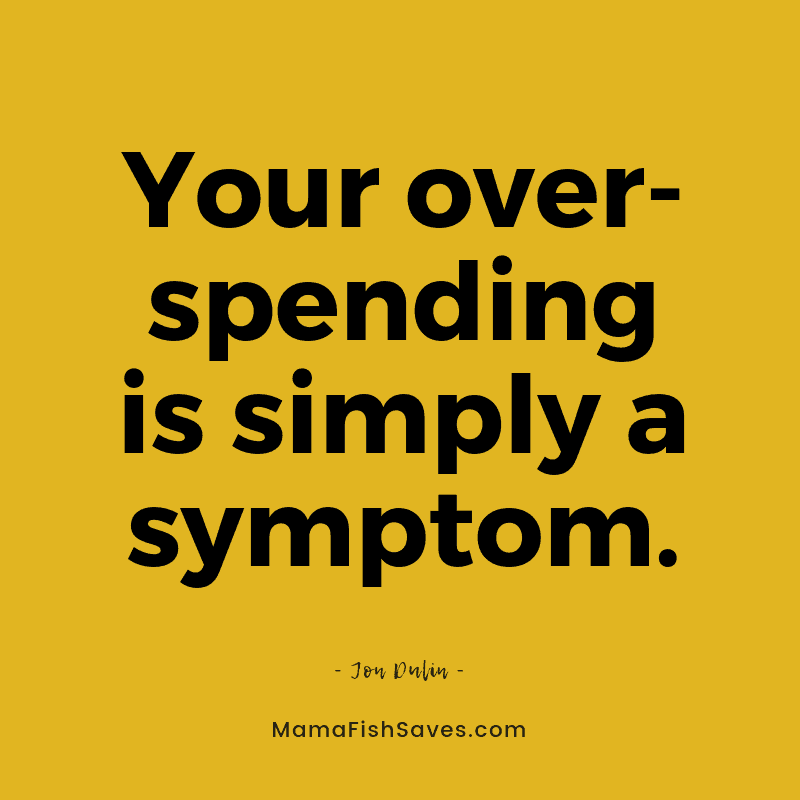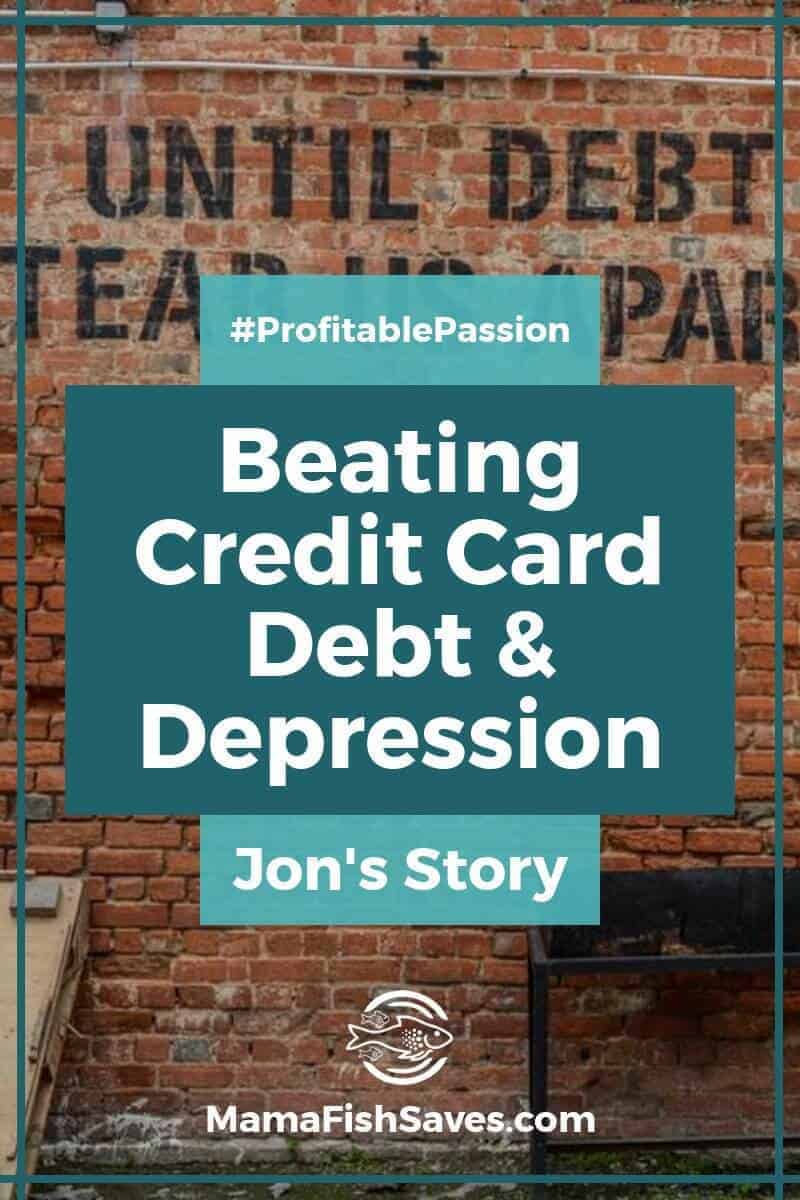We are back with another installment of the Aha! Moment debt series! This month we meet Jon, who graduated into a terrible job market in 2001, found himself underemployed, and spending money on a credit card to make himself feel better.
But the spending wasn’t the root of the problem.
Jon’s situation stemmed from depression around his prospects post-graduation. And he needed to do the work on his mental health to make long-term changes in his financial position and career. He couldn’t treat his money issues like the only problem.
When starting a debt journey, take the time to think about your money mindset and what got you into debt in the first place. It could be the difference between beating debt for good and slipping back over and over.
Check out Jon’s story below and start making progress towards your own debt-free life!
If you would like to be considered for an interview, drop me a note!
To read more stories in the Aha! Debt Interview Series check out the project’s page here.
Let’s get started…
Aha Moment Interview: How Real People Get Out of Debt

Tell us about yourself!
My name is Jon and I overcame over $10,000 in credit card debt.
I began to get into debt after graduating from college. I graduated in 2001 and this is when the economy was starting to go into a recession.
As a result, I couldn’t find a job. I was expecting numerous offers and a high starting salary. When this didn’t happen, I became depressed and started to buy things.
The process of buying things made me feel better about myself and made me forget that I was unable to find a job.
Eventually, I was able to get a job in the financial services industry and I worked in that field for close to 15 years.
I now blog about personal finance full time helping my readers understand money and how to take control so they can reach their financial goals.
How much debt do you have today and where did you start?
The only debt I have now is my mortgage. I started with around $12,000 in credit card debt and it took me a little over a year to pay this debt off.
While the struggle to break the debt cycle was tough and I shed a lot of tears, it was worth every moment. Being debt free opened so many doors in my life and allowed me to make the leap to self-employment.
What was your “aha” moment that made you realize you had to get out of debt?
I was out shopping and was about to buy a new jacket. For some reason, the light bulb went off and I questioned why I was buying this jacket when I had a couple at home already. And some of them I’ve never even worn yet.
I put the jacket back and drove home. On the drive home, I did a lot of thinking and admitted to myself that I depressed.
When I got home, I piled up all the clothing I bought on my bed and took a picture to put in my wallet to remind me of the wasted spending.
What lifestyle changes did you make while paying down debt?
I cut back on going out with friends. I also started therapy to help me overcome my depression. Talking things out with a therapist really did a lot of good and I continued to go even after my debt was paid off.
Did you have a side hustle (side job) to help you pay down debt faster?
I started to pay off my debt while I was working a part-time job. At that time I was paying just a little more than the minimum payments each month.
After a couple of months, I found full-time work. To help me pay off my debt, I kept the part-time job as well.
I used my full-time income to base my budget and allocated a good amount of that money to help pay off my debt. Then I took everything from the part-time job and used that to help pay off my debt faster.
What was the biggest setback you experienced while tackling your debt?
In the beginning, I lied to myself about my debt problem. I believed I simply had a spending problem and I could just stop.
So when I first attempted to pay off my debt, I did a 0% balance transfer to a new card to save money on interest.
But a couple of months later, I was spending on my original card all over again. Fast forward and I did another balance transfer thinking I could simply stop my “spending problem”. But yet again, I started spending on the original card all over again.
Did you use a debt snowball or avalanche?
For those of you who don’t know, you can read about both methods here. But the short story is that a debt snowball means paying off your debts from the smallest balance to the largest. An avalanche is paying off your highest interest debts first.
I used the snowball method to get out of debt. Given all of the previous attempts and failures to get out of debt, I wanted to take the approach that would keep my motivation high, so that is why I chose the snowball method.
Though I did consider the debt avalanche method. As a finance major, I understood how much money I could potentially save by using the debt avalanche over the debt snowball.
But at the end of the day, my ultimate goal was to be debt free. So I had to pick the method that would help me achieve this goal, even if it meant I paid more money in interest charges.
What financial mistakes did you make that other families can learn from?
The biggest mistake that I made that others can learn from was wanting to get out of debt overnight. I ignored the fact that it took me a couple years to get into debt and that it would take me some time to get out of debt.
So my first real try at paying off my debt saw me trying to live on a tight budget. So tight I didn’t allow for any fun money at all.
The first few weeks were easy, as I was motivated to be paying off my debt. But then I began to resent my debt since I was a hermit and not going out with friends or enjoying life.
This resulted in me rebelling and I started adding to my debt again. Luckily I realized my failure quickly and adjusted.
I accepted that I wasn’t getting out of debt overnight and I allowed myself some fun money to enjoy nights out. Doing this allowed me to enjoy life now while still making progress on my goal of paying off my debt.

The other mistake that others can learn from is looking at the reason as to why they are in debt. I thought I had a spending problem and many others think this too.
But many times the issue is deeper than this. Your spending is simply a symptom. It makes you feel good to buy things. This high that you get makes you forget about the underlying issue. Unfortunately, the high wears off faster and faster and so you spend more and more.
So, I would suggest you look within and get real with yourself. What issues are you dealing with that might be the real reason you are overspending? It won’t be easy, but it is worth it when you can finally break the debt cycle.
Now that you’re debt-free what is your next big financial goal?
My next financial goal is early retirement. My wife and I have plans to retire by age 55.
The process for achieving this goal began back in 2013. At the time we made a point to live off of one income and save the rest.
We had been living off my wife’s income and saving everything I made. My wife also earned an annual bonus which we put 100% towards savings as well.
But in 2016 we had our first daughter and our expenses changed. While we don’t save 50% of our income now, we are still saving between 35-40%.
The key for us is to not fall into the trap of thinking our daughter needs everything on the market. This can be a slippery slope and while we aren’t perfect, we make it a point to really think through purchases before committing.
Finally, where can readers find you and follow your story?
You can learn more at my site Compounding Pennies. I use my site to help readers better understand money and gain control of it so they can reach their financial goals.
I go into great detail about how I beat debt and the lessons I learned in the process as well. You can also follow my site on Pinterest and Facebook where I share my posts as well as other great posts from other bloggers as well.
Smart Money Mamas’ Thoughts
Thanks to Jon for sharing his debt-free story!
As I always do in these interviews, I want to share some thoughts:
- Overspending can be a symptom of something else. Jon’s overspending was his way of coping with his depression. Trying to fix the debt on its own, without addressing his mental health, would have been futile. Be willing to take a hard look at your money mindset and think about what got you into debt in the first place.
- Your enjoyment of life today still matters. This is becoming quite the recurring theme in this series. Getting out of debt is amazing, but if you do it to the detriment of all the things that matter in your life, you’ll get burnt out. Make room for fun in your budget. It’s a marathon, not a sprint.
- Debt doesn’t have to dictate your future. Jon went from underemployed with $12,000 in credit card debt to working towards early retirement at 55 with his wife. When you see success stories about people’s finances, don’t think that it can never be you. Make a plan and go get what you want.
Thank you again, Jon!
What did you think of Jon’s story? Any thoughts you would add?



